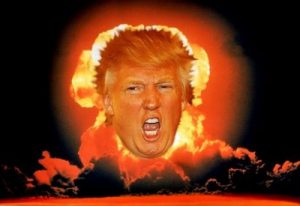Danger in Trump’s Mind
 On 7 April, a Mondoweiss headline ran as “Trump announces surprise Iran talks during Netanyahu meeting.”
On 7 April, a Mondoweiss headline ran as “Trump announces surprise Iran talks during Netanyahu meeting.”
United States president Donald Trump had met with Israeli prime minister Benjamin Netanyahu to discuss “Gaza, tariffs, and the alleged nuclear threat of Iran.” As for the latter, Trump said that the US is having direct talks with Iran on nuclear weapons and announced that there would be a “very big meeting” with important officials on April 12.
Said Trump: “I think everybody agrees that doing a deal would be preferable to doing the obvious.”
What is the obvious? If one abhors war and wants to avoid it, then it seems the obvious thing to do is to stop bullying Iran, stop provoking it, and stop issuing threats and engaging in belligerent rhetoric.
Trump continued: “And the obvious is not something that … we’re going to see if we can avoid it. But it’s getting to be very dangerous territory.”
Dangerous? How so? Just on Trump’s say-so? One would presume that Iran having nuclear arms is what Trump considers dangerous. If so, then what is the nuclear-armed Israel that Trump openly courts, funds, and fetes compared to Iran whose supreme leader Ali Khamenei issued a never-rescinded fatwa against acquiring nuclear weapons decades ago? How dangerous is Iran, which has avoided war for several decades, in comparison to Israel which is perennially provoking and at war with its neighbors, and is in the midst of a scaled-up genocide? Professor Gideon Polya writes of the “the US-backed, Zionist Israeli mass murder of about 0.6 million Indigenous Palestinian[s]” — a number elided by legacy media. Why has Trump not described Israel as “dangerous”? And why isn’t the US dangerous since it has been constantly at war since its inception, and it is the only country that has used nukes against another nation?
Trump: “If the talks aren’t successful with Iran …”
But US nuclear talks with Iran already were successful. The Obama administration already achieved what constitutes a successful nuclear deal with Iran — the Joint Comprehensive Plan of Action (JCPOA) — since the deal was agreed to by both sides. It was the Trump administration which scuttled the deal, i.e., reversed a success. So the current situation exists because Trump undermined a previous deal, and the very fact that a deal was reached should be considered a success.
“… I think Iran is going to be in great danger,” Trump continued. “And I hate to say it, great danger, because they can’t have a nuclear weapon. You know, it’s not a complicated formula. Iran cannot have a nuclear weapon. That’s all there is.”
That is hardly a compelling argument. Because Trump says so. He may point to the Nuclear Nonproliferation Treaty (NPT), but the US is also non-compliant with article 6 of the NPT.
Which nation is dangerous?
It is Israel and the US that are committing genocide in Gaza; Iran is not committing a genocide. Moreover, if you try to stop the genocide, then Trump will bomb you, civilian housing or not, as is the case in Yemen.
It is Israel murdering paramedics, covering up its crime, and lying about it.
It is Trump and Netanyahu’s aggressive moves toward Iran that are dangerous.
Indeed, an Israeli official said that Netanyahu wants “the Libya model” in Iran, which would require a complete tearing down of Iran’s nuclear program.
What was the outcome of the Libya model? Libya was disarmed, and the US and its Nato followers destroyed Africa’s wealthiest country, turning it into a dysfunctional state. That is likeliest the result that Israel wants for Iran.
Is the world to be based on inequality among its nations? If not, then a progressivist principle holds that each nation has an inalienable right to self-defense. One way to avert war is to balance the power. North Korea knows what happened to Libya. It is now nuclear armed and this serves as a deterrent to aggressive nations who might otherwise attack it. Iran knows this as well. Ask yourself: if Iran was nuclear armed would Israel and the US be foolish enough to attack Iran?

No comments:
Post a Comment